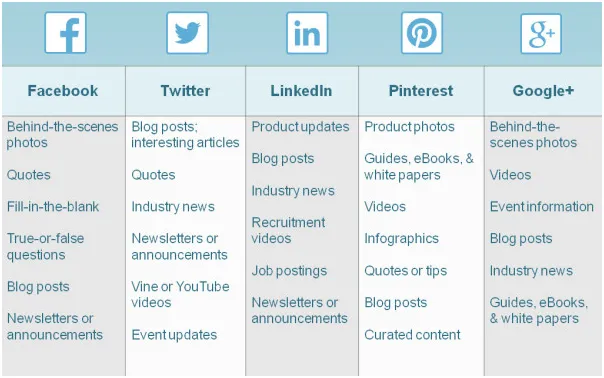

The Role of Social Media in Branding a Local Business
There was a time when advertising meant television commercials, newspapers ads, and promotional flyers. However, the advent of social media networks such as Facebook, Instagram, and Twitter have taken traditional marketing and advertising by storm.
A large part of your target audience already uses one or more of these social media platforms. And with the help of social media marketing campaigns, you can reach out to this audience effectively and economically.
According to a report, 93% of marketers use Facebook advertisements regularly. That means that roughly 3 million businesses use Facebook as a marketing tool. Also, 80% of Instagram users follow one or more of the 25 million business profiles on the network.
Looking at these numbers, we can understand that social media is an extremely important platform to spread the word about your business. However, while social media marketing can be useful for any kind of business, it is highly recommended for local businesses.
Owing to the small scale of such businesses, they might not have a large marketing budget. This restricts them from utilizing most conventional marketing and sales techniques, such as those provided by Salesmate and Zoho. Many of these businesses also have a small team, often without dedicated and experienced marketing personnel.
Social media gives such businesses the ability to run simple and cost-effective advertising campaigns. It helps business owners create buzz about their products or services. This, in turn, is extremely useful in the brand building of local businesses. It also allows such businesses to reach a wide audience.
Let’s take a look at the role social media plays in the brand building of local businesses.
1. Expands Your Reach
If you are about to start a new local business, it is very important to create a buzz about your products or services. A judiciously executed social media campaign can be very fruitful in this regard.
As a marketer, your first step is to identify and understand your target audience. The next step is to create and upload content that appeals to the sensibilities of this audience.
For instance, Facebook uses certain algorithms to assess the type of posts a user engages with. Based on user behavior, the platform judiciously includes suggested posts in a user’s News Feed.
With the use of relevant hashtags and paid ads, your posts can pop up in the News Feeds of your target audience. Focusing on location-specific hashtags can help you to target the local community.
Canadian Woodworks, a Toronto-based custom furniture maker, has tapped into the potential of Instagram to create brand awareness. Their Instagram profile echoes the inspiring journey of a man who started out from a small workshop in Ontario.
Today, the business has over 351,000 Instagram followers eagerly anticipating the pictures of hand-crafted wooden furniture.

Image via Instagram
User-Generated Content and Its Importance
Running a local business comes with a number of challenges. Amidst the daily activities of your business, your team may not always have the time to upload quality content on social media.
That is when user-generated content can come to your rescue. It also increases the credibility of your products or services and reinforces brand trust.
Encourage your customers to share testimonials about their positive experience with your brand. You could also request that they share pictures of themselves while using your products or services.
Whenever you can’t come up with a creative social media post for the day, you can upload one of these posts. These can be extremely useful in building a positive brand image.
Most consumers find it difficult to trust brands that blow their own trumpets. Instead, they prefer to rely on recommendations from their friends and acquaintances. And what better way to get recommendations than propagating user-generated content?
2. Increases Engagement
Even the most appealing social media campaign can fail to have an impact if it falls on deaf ears. The content you upload on social media needs to grab the viewer's’ attention immediately. Further, it needs to hold the audience’s attention for a significant amount of time. Both factors are equally important in building brand awareness.
If viewers appreciate the content you post on social media, they might share it with their own networks. If the content is really good, it might get shared further, making it viral. This boosts the visibility of your content and creates buzz about your local brand.
Choose the Right Platform
It is important that you choose the right social media platform for your local business. Depending on the nature of your business, certain platforms might offer better engagement than others.
For instance, a wedding photographer will garner a better following on Instagram. On the other hand, a local grocery store may attract more users on Facebook.

Image via lyfemarketing.com
Likewise, it is important that you choose the right type of content for the right platform. While images and graphics are more popular on Instagram, blog posts and quotes find better traction on Facebook.
You can also create variations of the same content for different social media networks. However, ensure that all posts across different platforms are consistent with your brand’s image.
Collaborate with Micro-Influencers
Micro-influencers often have a relatively small and localized, yet fiercely loyal and engaged following on social media. Their fans see them as role models and swear by the recommendations made by these micro-influencers.
If you want to attract a local community, identify relevant micro-influencers from the region and collaborate with them. A feature on their social media page will steer their followers towards your business.
Working with micro-influencers also helps you establishes trust and improves customer retention. This is because of the friendly rapport they share with their followers.
Unlike high-profile influencers with millions of followers, micro-influencers are more affordable for local businesses. For instance, the team behind Mason Jar Storage reached out to micro-influencers to market their mason jar racks. They collaborated with influencers from canning, home crafts, and cooking verticals and saw great results.
3. Helps You Target with Precision
Networks such as Facebook allow advertisers to create sponsored ads to target very specific audiences. You can specify user demographics including location. Facebook’s internal algorithms will ensure that your post reaches the right users. This is especially useful when you want to target a local community and attract them to your business.
It is also likely that people don’t run a Google search for products or services they use locally and regularly. They would probably opt for the one that is nearest to them. The advantage of paid Facebook adverts is that they automatically pop up in the News Feed of your target audience.
In addition, you can target users based on their interests, job titles, and online behaviors. Such detailed targeting ensures your advert is visible to only those users who will find your content relevant. Make sure you specify a target audience that is neither too wide, nor too specific. You can also promote offers and coupons in your ads to engage your audience.
4. Helps You Provide Quick Customer Service
It is not enough to generate brand awareness and attract new customers. In order to build a positive brand image, you must work toward retaining your existing customers as well. The key to doing this is proactive customer service. Social media can be used as an effective tool for this purpose.
Customer service is especially important for local businesses since your audiences is situated in a specific geographic location. A negative customer experience can propagate quickly via word of mouth and drive potential clients away from your business. Therefore it is imperative that you address any grievances expressed by your customers.
Be proactive in engaging with your audience on social media. If they share any negative feedback about your brand, respond with an acknowledgment. Assure them that such a situation won’t happen again should they use your products or services in the future. This reinforces their trust in your brand.
In addition, this can improve your brand’s online reputation. When potential customers find you actively addressing issues on social media, it conveys that you value your clients. It also tells them that if they have problems with your product or service, they can reach out to you on social media. This enhances the credibility of your brand.
Make sure you also respond to the comments on your social media posts. This presents you as a brand that is active in the online space, making it easier for potential customers to have faith in you. Avoid posting scripted replies. Instead, personalize your responses as much as possible.
Let the Numbers Talk
Executing successful social media campaigns doesn’t mark the end of your branding efforts. You have to constantly assess how your target audience is reacting to your campaigns.
Keep an eye on the following metrics to measure the success of your social media marketing strategy:
- Reach – This indicates the total number of users who have seen your post or advert. A larger reach means your campaign is steering in the desired direction. It also suggests you have identified your target audience correctly.
- Engagement – Are users reacting to your posts by commenting and sharing? Are they actively responding to your call-to-action? All of these factors are crucial to understanding if your social media campaign is running successfully.
- Local search results – As you create buzz about your brand, the results should start reflecting in your search engine rankings. The sooner you show up in search engine results, the more fruitful your efforts are likely to be. However, for this, you’ll need to use advanced SEO techniques as well.
- Cost metrics – Analyze how much you are spending on sponsored posts. Make sure the ROI is favorable enough for you to continue with the campaign.
Final Thoughts
In the absence of ludicrous marketing budgets and experienced advertising personnel, traditional methods of marketing don’t work for local businesses.
Social media networks offer an economic and effective platform on which small businesses can create buzz. Most of these platforms have simple interfaces. This makes it possible for local business owners to turn into marketers, even with little social media know-how.
When it comes to promoting a local business and building your brand, social media has immense potential. If you have a local business, it is high time you start planning your social media strategy.
Do you know of any other ways to use social media for branding a local business? Please share your views with us in the comments section below.




